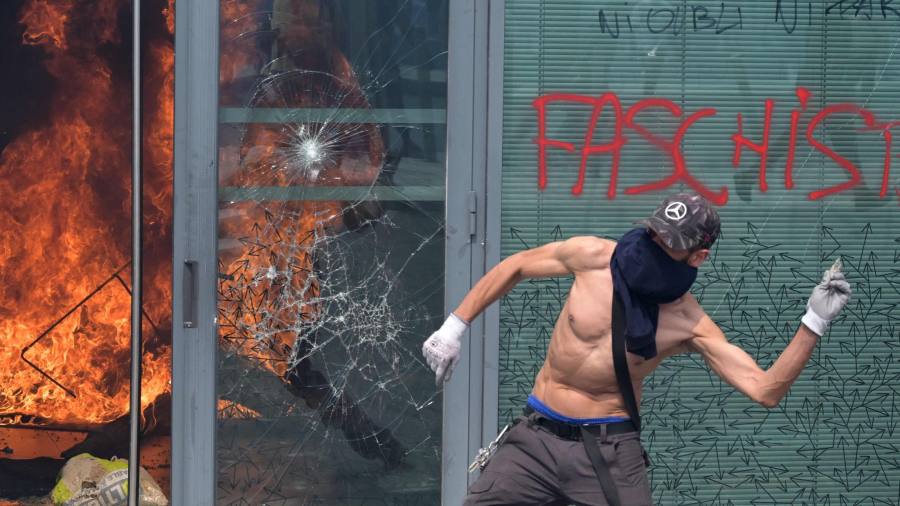Receive free French society updates
We’ll send you a myFT Daily Digest email rounding up the latest French society news every morning.
Three nights of rioting across France have once again exposed the country’s acute social tensions at a time of growing political polarisation.
The latest protests demonstrate that France’s impoverished, ethnically-mixed neighbourhoods remain a powder keg, riven with a feeling of injustice, racial discrimination and abandonment by the state. The criminal disorder, though shocking, is not yet on the scale of 2005, when more than 10,000 cars were torched and more than 230 public buildings damaged in a three-week orgy of violence. But the authorities understandably fear a repeat.
This week’s unrest, like that of 18 years ago, was triggered by the death of a non-white teenager after a police chase. Different this time is the power of social media to propagate unrest. The far-right is also stronger than it was in 2005. And this time around President Emmanuel Macron and his government have sought to defuse tensions rather than stoke them.
In 2005, the then interior minister Nicolas Sarkozy described the young people involved in disturbances in the housing estates of outer Paris as “scum” who needed to be “got rid of”. A few days later, two teenagers, one Mauritanian, one of Tunisian origin, were electrocuted as they hid from the police in an electricity substation in a suburb north-east of the capital. Sarkozy and his prime minister Dominique de Villepin sided with the police and suggested the two boys were thieves.
By contrast, Macron described the police shooting of a 17-year-old-boy of north African origin as he drove off in a car in Nanterre, north-west of Paris, as “inexcusable” and “inexplicable”. The officer concerned was suspended from duty, arrested and placed under investigation for murder.
Macron was attacked by rightwing opponents and the police unions for undercutting the presumption of innocence — and accused of betraying the police. But the necessity of the president’s intervention became apparent when a video of the shooting appeared on social media, clearly contradicting an initial account from police sources that the officer had fired his gun because his life was in danger. Not appearing to condone police violence is a necessary if not sufficient first step towards restoring public order.
Some experts have blamed the shooting on Tuesday on a law passed in 2017, before Macron came to power. This appears to give the police more powers to shoot at a car if its occupants fail to comply with a police order and put an officer’s life in danger.
Macron’s critics will be tempted to argue that he indulged a dysfunctional police force, along with his hardline interior minister Gérald Darmanin, calculating that to do otherwise would play into the hands of the far-right. But the recent evidence of police shortcomings is plentiful: excessive use of force during anti-government protests; racist violence, such as the savage beating of a black music producer caught on camera; incompetent public order policing, as seen at last year’s Champions League final; a breakdown in trust with local residents, which could be reversed with a shift to community policing. The police are poorly resourced but also badly trained. The high level of support for the far-right among officers is also worrying.
The rioting is a reminder of the deep-seated social and economic problems in France’s poorer districts and the long legacy of government neglect. There have been achievements since Macron won power in 2017, particularly the fall in overall and youth unemployment. But entrenched poverty, crime, racial discrimination and educational underperformance require more government attention and resources even if public finances are tight. Macron’s promised Quartiers 2030 plan for these areas has been slow to take shape.
None of these problems justify rampaging violence. Some of the young men fighting the police on the streets will feel righteous anger; others will just relish the thrill — and enjoy sharing it on social media even more. The longer the riots continue, the harder it will be for the government to resist taking a heavier approach. If the unrest spreads, it can only help the far-right, which has the political momentum and every interest in conjuring the spectre of civil disorder.
Read the full article here




